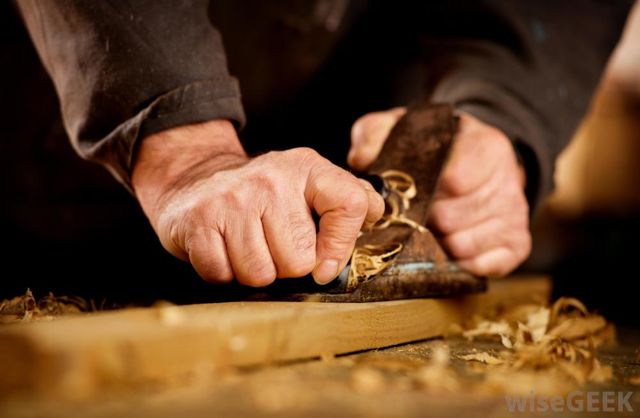
During my lifetime I have had performed a wide variety of jobs, some exciting, some rather mundane and others even unpleasant. However, perhaps the greatest secret I have discovered is to find pleasure in work, no matter what the task.
By Peter Schaller
My grandfather was a carpenter all his life.
I don’t know if he ever told me how he learned the trade, but I do know that he built many houses in Connecticut, during a large portion of the twentieth century. He was born in 1900 and I suspect that he probably built most of the homes from the 30s to the 60s. I have always imagined him sitting with perspective clients, young couples pursuing the American Dream before it was kidnapped and held for ransom. They would have bright eyes and comfortable dreams, as my grandfather methodically developed the plans for their future home. I remember him telling us that he built his own house, where my dad grew up, for $3,500 during the depression.
My grandfather was a craftsman. I will always remember the shop he had in the basement, where he would make bird feeders and doll houses from the scrap lumber he brought home from his job sites. The walls were lined with peg board and all of his tools were hung with meticulous care. He was already 69 when I was born, so by the time I was old enough to swing a hammer, he was not doing much building or wood working anymore.
I would have loved to have worked by his side and learned from the dexterity in his skilled hands and his creative mind.
I do know that it pleased him when, as a teenager, I began to work summers and weekends on a construction crew. When I eventually decided to forego college in order to roof houses, I could tell that my grandfather quietly approved. My dad, who had broken the blue collar mold by going to law school, did not. With my growing love for building, my grandfather and I had more to talk about. When I would visit, we would sit on his screened porch and talk about lumber, joinery, and the immeasurable virtues of Stanley tools.
There was a building boom going on in Connecticut during the 80s and 90s and without question, craftsmanship was in short supply. The job sites were full of what carpenters that we would refer to as “hacks.” A hack is someone who may literally hack things to pieces, but is generally someone who thinks he or she might know a few things about carpentry, but really doesn’t. The quality of work during a construction boom is lamentable and I know this distressed my grandfather, as cardboard condominiums and generic developments went up around his hand crafted home.
My grandfather was old school and did not own his first power tools until the fifties.
He knew how build an entire house, from foundation to roof, without using any tools powered by electricity. Today that is almost unthinkable. But, it gave him a reference point for all things related to building and wood working. He believed that any decent carpenter should be able to craft anything without the luxuries of power tools and prefabricated pieces. He had one great test for any carpenter: doors.
I changed jobs a lot in those days, because there was so much building going on everywhere. It was easy to negotiate an extra 50 cents or dollar an hour, if a builder was heavy on work and light on workers-hence the abundance of hacks on any given job site. Every time I would change jobs, I would mention the name of the builder and my grandfather would always ask the same question.
“Can he fit and hang his own doors?” he would ask.
That, to him, was the truest test of any carpenter and it was an endangered skill. Doors and door jams are prefabricated anymore, and come ready to install. A lot of them even have the trim nailed to one side, so all you have to do is shim it into place and nail it. But, fitting and hanging your own doors, which my grandfather did during his career, required an exceptional amount of skill. It meant making your own jams, joining them with rabbit joints, morticing the hinges, making sure the door and jamb were square, level and plumb. Then of course, it would have to be trimmed on both sides. The generally accepted margins of error for carpenters are 1/8” on framing and 1/16” on trim work. That’s not much.
And so, I have also used this measuring system throughout life, not just with the things I build, but in everything I do. While my grandfather was referring quite literally to fitting and hanging doors, it was also a lesson about learning to do things the right way, learning the whole process, refining skills and knowledge and paying special attention to craftsmanship. It is easy, in our world of prefabricated convenience, to forget this.
The work we do during our short stay in this world really does matter.
Whether we build homes, clean floors, cook meals, raise children, craft budgets, manage, mop, sweep, stack, write, sew or weld—we should do it with great care. Our work is the evidence of our existence and the product of our learning. During my lifetime I have had performed a wide variety of jobs, some exciting, some rather mundane and others even unpleasant. However, perhaps the greatest secret I have discovered is to find pleasure in work, no matter what the task.
Work can be meditative and fulfilling.
Even hectic jobs where stress is continual and rewards are few, can be made pleasant. It all depends on how we approach our work. Granted, I am well aware that the type of work we do is also closely related to privilege. Those of us who are born into favorable population groups, based on skin color, gender and country of origin, are more likely to have access to a variety of work opportunities. That is all the more reason to not only find employment that is satisfying, but also contributes to the greater good.
As Gary Snyder wrote “Find your place on the planet. Dig in, take responsibility from there.”
I haven’t had to fit and hang a door in many years, but I know I still could.
Photo: Peter Schaller
Feature photo: Pixabay
Editor: Dana Gornall
Were you inspired by this post? You might also like:
Comments
- Saturday Morning, the World is Renewed - April 27, 2019
- Lift Them Up: Right Speech in a Contentious World - March 31, 2019
- Chasing Away the Cold and Flu Blues…The Natural Way - January 21, 2019





